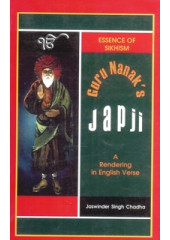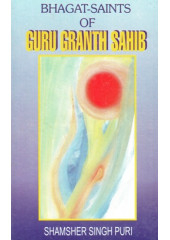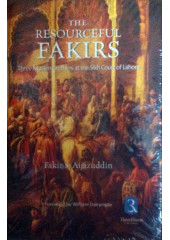Monday to Saturday - 10:00 Am to 9 PM
Now Enjoy Bulk Discounts on Books as Mentioned Below
These Discounts are in addition to the Discounts on Individual Books (Visible as Bulk Discount for Books in Cart)
Extra 10% Off If Books Purchased Exceeds Rs 3000 or 75 USD or 60 GBP or 60 Euro or 100 AUD or 100 CAD
Extra 15% Off If Books Purchased Exceeds Rs 6000 or 150 USD or 120 GBP or 120 Euro or 200 AUD or 200 CAD
Extra 20% Off If Books Purchased Exceeds Rs 15000 or 225 USD or 180 GBP or 180 Euro or 300 AUD or 300 CAD
Extra 25% Off If Books Purchased Exceeds Rs 30000 or 300 USD or 240 GBP or 240 Euro or 400 AUD or 400 CAD
Summary of 'The Japji And The Rehras' By Khushwant Singh
I am not a religious man, but I call myself a Sikh and am proud to be one. As with every religion, Sikhism has been misinterpreted by bigoted and cynical people, but that is a failure of men, not of the faith. In its essence, Sikhism remains a great religion that teaches all that I value: tolerance, simplicity, equality, service to the community and to all humanity.
Sikhism was born of and influenced by the two dominant faiths of Punjab, Hinduism and Islam. Guru Nanak (1469-1539)-the founder of the Sikh religion-drew upon Hindu Bhakta and Islamic Sufi philosophy to spread a message of love and universal brotherhood, and of simple worship beyond dogma and empty ritual. His teachings fired the imagination of the peasants of Punjab, and he became the beloved saint of both Hindus and Muslims. Even today, he is remembered as the king of holy men:
Baba Nanak shah fakir Hindu ka guru musalman ka pir
(Baba Nanak, the King of Fakirs, To the Hindu a Guru, to the Muslim a Pir)
Nanak was followed by nine Gurus, who carried forward his legacy and consolidated the Sikh faith.
Sikhism preaches belief in the unity of God (Ek Omkar: God is One) and equates God with truth (Sat Naam: His Name is Truth). Sikhs do not believe in sacred rivers or mountains, nor do they worship idols: 'To be saved, worship only the Truth,' said Nanak. The Sikhs do not have priests. There are, now, professional scripture readers (granthis) and musicians (ragis), but in fact, irrespective of status, all Sikhs are competent to perform religious ceremonies.
The Sikh religion does not recognize the caste system. Nanak's teachings and verses abound with passages that describe as ungodly the conduct of those who treat anyone as untouchable. Among the first five Sikhs to be chosen as the Khalsa (the Pure) by the last Sikh Guru, Gobind Singh, was a Dalit, Bhai Dharam Singh. (Unfortunately, many Sikhs still discriminate against the lower castes, and fail their faith and their Gurus.)
A feature of the Sikh religion which is particularly striking is its emphasis on prayer. The form of prayer is usually the repetition of the name of God and chanting hymns of praise. Sacred hymns composed by the first five Gurus and the ninth Guru, and by Bhakti and Sufi saints like Kabir, Baba Farid and Mira Bai, were compiled and collected in the Adi Granth, or Granth Sahib, the holy book of the Sikhs, by Arjun Dev (the fifth Guru) and Gobind Singh (the tenth and last Guru). The hymns of the Adi Granth are divided into thirty-one ragas, in which they are meant to be sung. The Gurus believed that repeating the name of Godand divine worship through music were the best means of attaining the state of bliss-vismad-that resulted in communion with the Almighty.
When Gobind Singh declared that with him the line of succession of the Sikh Gurus had ended, he asked his followers to look upon the Adi Granth as the symbolic representation of all the ten Gurus. Since then, it has been the central object of Sikh worship and ritual.
The Japji-the morning prayer-was composed by the first Guru, Nanak, himself, and appears at the very beginning of the Adi Granth. It consists of the mool mantra-the root or primal mantra-that is the basis of Sikh theology, followed by thirty-eight pauris, or hymns, and a final shloka. All of it does not seem to have been written at one time and the length of its verses, their metre and thought content varies. The verses are in the nature of meditations, dealing with the fundamentals of the Sikh faith. In these verses, Nanak mentions four successive steps towards salvation: dharam khand, gyan khand, karam khand and sach khand, corresponding to discipline, knowledge, action, and ending with the blissful merger with God. These steps follow very closely the four stages of the spiritual progress of the Sufis.
Unlike the rest of the Granth Sahib, the Japji was not set to music and is never sung. The language of the Japji is the Punjabi of the fifteenth century and is extremely difficult to translate. My translation is largely based on the commentaries of the famous Punjabi poet and scholar Bhai Vir Singh.
The Rehras is the evening prayer, recited around sunset. It comprises verses by five Gurus-Nanak, Amar Das, Rani. Das, Arjun Dev and Gobind Singh. The origin of the word 'rehras' is disputed by scholars and theologians. The most widely accepted interpretation is that it stands for 'humble invocation'.
The Rehras as a prayer is not mentioned as such in the Adi Granth, and it has been used only once as a word- Har kirat hamri Rehras ('That I sing God's praises is my humble invocation')-in the main body of the prayer. But there is reason to believe that the Rehras, in some form or the other, has been recited at close of day since the time of Guru Nanak. Bhai Gurdas, who was a near contemporary of Guru Nanak and lived up to the time of Guru Arjun, records:
The Japji And The Rehras - Book By Khushwant Singh
- Brand: Rupa Publications
- Product Code: GURE151
- Availability: Out Of Stock
-
Rs.495.00
Related Products
The Essence of Japji - Book By Shamsher Singh Puri
Summary of 'The Essence of Japji' By Shamsher Singh Puri The original Punjabi text of the Japji i..
Rs.120.00
The Sikh Religion - Its Gurus, Sacred Writings and Authors (Set of 6 Volumes) - Book By Mac Arthur Macauliffe - Edition June 2021
Introduction to the Book 'The Sikh Religion - Its Gurus, Sacred Writings and Authors (Set of 6 Volum..
Rs.1,500.00
The Lives And Teachings of the Sikh Gurus - Book By Harish Dhillon
Preface Of The Book 'The Lives And Teachings of the Sikh Gurus' By Harish Dhillon At the time of ..
Rs.225.00
Sikh Ceremonies - Book By Joginder Singh
From The Backcover Of 'Sikh Ceremonies' By Joginder Singh I feel it a privilege to write an..
Rs.100.00
Guru Arjan Dev - Book By Dharam Singh
Introduction to the Book 'Guru Arjan Dev' By Dharam Singh The story of the ten Gurus, or spiritua..
Rs.120.00
Sri Guru Nanak dev's Japji - Book By Dr G.S. Chauhan
Summary of 'Sri Guru Nanak dev's Japji' By Dr G.S. Chauhan "An invaluable guide for tho..
Rs.195.00
Guru Nanak Japji - A Rendering In English Verse - Book By Jaswinder Singh Chadha
Summary of 'Guru Nanak Japji , A Rendering In English Verse' By Jaswinder Singh Chadha At o..
Rs.100.00
Me Judice - Book By Kapur Singh
Introduction To 'Me Judice' By Kapur Singh It has been customary to regard Guru Nanak as a mediev..
Rs.300.00
Bhagat Saints Of Guru Granth Sahib - Book By Shamsher Singh puri
Introduction To 'Bhagat Saints Of Guru Granth Sahib' By Shamsher Singh puri Much remains to be wr..
Rs.150.00
Hymns Of The Gurus - Book By Khushwant Singh
From The Front Cover Of 'Hymns Of The Gurus' By Khushwant Singh 'There is one God. He is the Supr..
Rs.250.00
Let's Know Sikhism - A Religion Of harmony, Brotherhood And Tolerance - Book By Kartar Singh Bhalla
From The Backcover Of 'Let's Know Sikhism - A Religion Of harmony, Brotherhood And Tolerance' By Kar..
Rs.295.00
33 Swaiyas - Book By Bhai Jodh Singh M.A.
Foreword To '33 Swaiyas' By Bhai Jodh Singh M.A. These Thirty Three swaiyas give the gist of the ..
Rs.20.00
The Resourceful Fakirs - Book By Fakir S. Aijazuddin - Three Muslim Brothers at The Sikh Court Of Lahore
The Resourceful Fakirs - Book By Fakir S. Aijazuddin - Three Muslim Brothers at The Sikh Court Of La..
Rs.1,295.00
Tags: book by khushwant singh, isbn 9788129124098, the japji and the rehras















